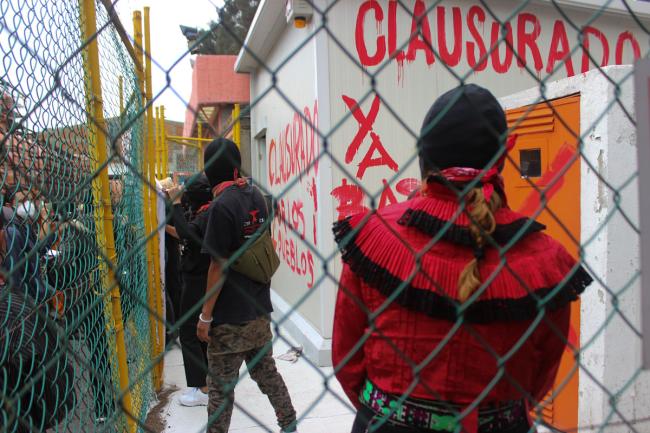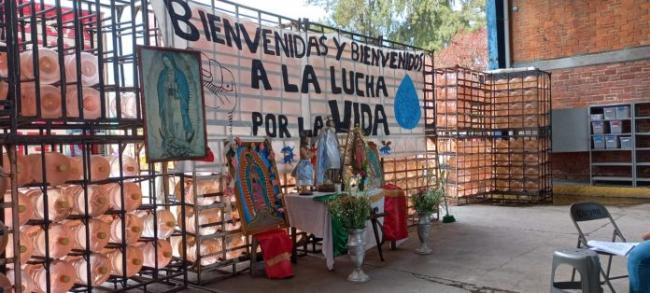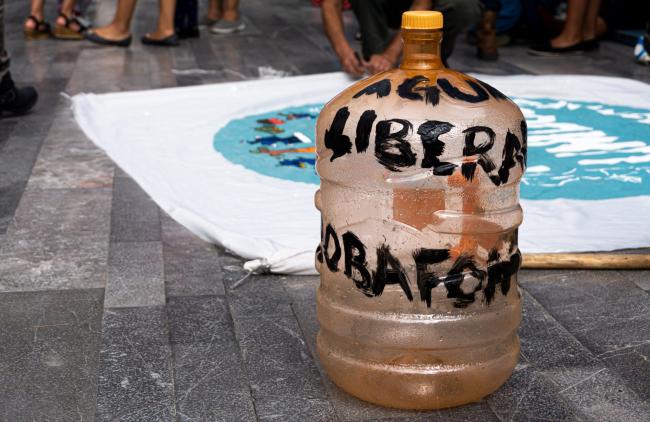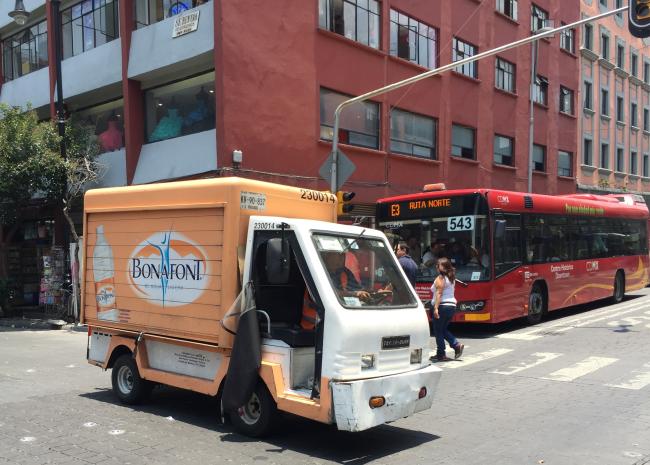
Leer este artículo en español.
"Here the water is extracted, sold and, with impunity, given to [transnational companies] such as Bonafont, Volkswagen, [and] Ternium," said Nahua Indigenous activist Adela in conversation with Desinformemonos. Hailing from the Sierra Norte region of the central Mexican state of Puebla, she was explaining the many facets of the Nahua peoples' struggle against the corporate capture of water in the region.
Adela—also a member of the organization Pueblos Unidos de la Región Cholulteca y de los dos Volcanes—draws on a generations-long struggle to protect their land. In March, she attended the Fourth National Assembly for Water and Life in the central state of Tlaxcala. Nearly 600 participants from over 150 collectives and organizations from over a dozen states attended the assembly. A fifth assembly will be held in August.
"The Nahua people who inhabit the region since millenary times have defended our territory, we have a culture of struggle and defense," she said.
Three years ago the people of los dos Volcanes shut down the well at the Bonafont bottled water plant in Puebla City, owned by Paris-based, agribusiness giant Danone. This was a moment that Adela said continues to be a "symbol of freedom that we as peoples have built and that we sustain."
Turning off the tap at Bonafont released millions of liters of water back into local rivers and streams, according to multiple testimonies.
After some four months of blockading the Bonafont plant and shutting down its operations, the Indigenous and local communities protesting the company entered the plant itself and took it over, disabling surveillance cameras.
The communities occupying the plant renamed it Altepelmecalli, meaning "the house of the people" in the Indigenous Nahuatl language.
For 11 months, the site was home to cultural and community events, talks, a library, farm animals, artworks, a media center, and a free community doctor. In February 2022, military and state security forces violently evicted protestors.
The building remained empty and under heavy guard until September of that year, when Bonafont reopened it as a distribution center for bottled water, saying that the well had been vandalized and possibly contaminated by the activists and could no longer be used to supply the company. CONAGUA, the national water authority, had also initiated an administrative procedure against Danone for non-compliance with the conditions of its concession.
The Assembly for Water and Life named Altepelmecalli as one of a number of recent social movements "recovering spaces of power and capital, turning them into places where 'El Común' (The Common) was built." The Common refers to collective work to address hegemonic structures that destroy life, including the assembly in March and other forms of organizing.

Day Zero: Critical Water Levels Across the Country
That communities in Mexico might take maldistribution of water into their own hands is hardly surprising. Global climate change has caused a steady increase in drought and flooding, but it is principally years of state and criminal repression, government inaction, systemic corruption, and corporate capture that accounts for the severe inequalities in access to safe, plentiful water throughout the country.
The problem is stark, according to data gathered by the non-government organization Cántaro Azul that works in the southern state of Chiapas. Only 43 percent of the population in Mexico has secure access to quality water. In rural areas, only 42.6 percent have water every day with an exclusive outhouse and connection to a drainage network or septic tank. The consequences of this are dire and include preventable deaths from gastrointestinal illnesses and increased reliance on costly bottled water and sugary drinks that cause other health problems such as diabetes and malnutrition.
Mexico City has lately been the subject of international media attention, with contamination found in the municipal water pipes of the Benito Juárez borough. The capital is also once again said to be approaching "Day Zero," or a critical moment when a city's water supply is almost entirely depleted. This is due, in no small part, to poor maintenance of the infrastructure that draws water from the Cutzamala inter-basin supply system and loses some 40 percent of it through cracks and fissures in the pipes.
For some parts of the sprawling metropolitan area, though, Day Zero arrived a long time ago. In parts of northern Mexico in 2022, for example, locals struggled to access clean tap water while companies, including the Coca Cola Company, continued to extract billions of liters of water while refusing to offer price reductions for bottled water. In many rural Indigenous communities, people must walk miles every day to collect water from faraway wells.
"It's Not Drought, It's Looting"
When pressed on the issue of water management in Mexico, the country's political leaders cite the severe drought conditions that have been affecting various parts of Mexico for many years, related to climate change and the La Niña effect. For water rights activists, "no es sequía, es saqueo." It's not drought, it's looting—a longtime refrain of social movements in Mexico protesting the problems of water scarcity.
"CONAGUA [Mexico's national water administrative authority] continues to hand over water to transnational companies and private initiative, through 'concessions' that are nothing more than a disguised form of water privatization," said National Indigenous Congress spokesman Carlos González García in the opening plenary of the assembly.
González detailed that there are over 150 overexploited aquifers, and that the largest "water hoarders" are multi-billion dollar companies. "Danone extracts 15 billion liters of water per year, Coca-Cola 55 billion, PepsiCo has 32 billion liters of water concessions, Danone 15,400 million, and Nestlé 9,700 million," said González.

It is actually quite difficult to get exact numbers on how much water is being extracted and by whom in Mexico, as government data collection mechanisms are too broad, said Raul Pacheco-Vega, professor of the Facultad Latinoamericana de Ciencias Sociales (FLACSO).
At any rate, "one of the reasons why bottled companies are usually visible as culprits is that the product they sell is precisely what we cherish the most, the vital liquid," he said, before adding that the industries of agriculture and automobile production also contribute significantly to water extraction.
Touristification and Other Frontiers of Water Justice
Among its many denunciations and demands, the final Declaration of the Assembly for Water and Life repudiates the militarization of Mexico and particularly the targeting of Indigenous water defenders by police and armed forces, as well as "the growing gentrification of cities and Indigenous peoples in response to the demand for water."
Along with the growing urgency of water scarcity, two hallmarks of the Andrés Manuel López Obrador (AMLO) administration have been the expansion of the ranks, power, and functions of Mexico's armed forces, and the gentrification and housing crises due to the extraordinary influx of tourists and remote-working immigrants, popularly referred to as "digital nomads," primarily from the United States.

There is also an emerging intersection between Mexico's water crisis and the growth of the military: The armed forces are posed as the solution to water scarcity. In an April report monitoring the transfer of power to the military through government contracts, a coalition of non-governmental organizations noted that the largest contract they identified was to have the army supply drinking water to the state of Nuevo León. Media reports of the contamination in Benito Juárez were rife with images of the Navy addressing the issue. The National Guard was also deployed with rifles in hand to guard the wells from contamination.
Tourism and gentrification also intersect with militarization and water scarcity. As tourism boomed last year, Congress agreed to have 80 percent of tourism taxes flow directly to the Secretariat of Defense. Non-resident visitors to Mexico currently pay $533 MXN, equivalent to $32 USD, per person/visit. Thousands of these "digital nomad" remote tech workers have also set up residence in Mexico since 2020. Their installation has significantly altered the social composition and economy of some parts of the country and is becoming a popular object of local frustration regarding skyrocketing rent prices, forced evictions, real estate speculation, urban displacement, appropriation of national and Indigenous culture, and indeed the prioritization of water resources. As tourism is set to expand even further due to the Tren Maya megaproject under the direction of the armed forces, the aquifer that supplies southeastern Mexico is on the brink of contamination and even collapse.
With the military surveillance and repression of the Indigenous activists trying to save their water sources, and the domination of corporate interests as politicians reap the socioeconomic benefits, the 2021 Bonafont takeover offers a crucial display of the dynamics of Mexico's water justice crisis.
Looking Ahead to an Electoral Process That "Does Not Represent Us"
As presidential, state, and local government elections are set to be contested on June 2, Mexican politicians are touting various solutions to the water crisis. According to an analysis by the national daily El Universal, "water" was one of the most used words in the second presidential debate televised on April 28. It was also a central theme of the debate between candidates for Mexico City's head of government on April 22. Frontrunner Clara Brugada of the federal ruling party Morena promised that if she wins, she will guarantee the right to water for the people of the capital. Santiago Taboada, Brugada's rival, pushed for the privatization of public water, which has already occurred in Puebla City. No concrete or detailed proposals for resolving Mexico's water crisis have been offered by electoral candidates, even as the country suffers from a record-breaking heat wave.
The activists at the water assembly in March took a clear stance on the possibility of an electoral solution. "The upcoming electoral process does not represent us," read their declaration.
"We say: vote or don't vote, [but] get organized and declare that 'our prisoners, our disappeared, our dreams, our nightmares and our dead do not fit in their ballot boxes.'"
The photograph provided as a courtesy by Arturo Contreras Camero is from an article originally published by Pie de Página.
The photographs provided as a courtesy by Karen Castillo are from an article originally published by ZonaDocs.
Ann Louise Deslandes is an independent journalist based in southern Mexico.

